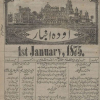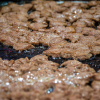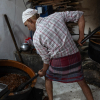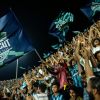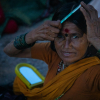Video transcript
Anubhav Sapra: This is a very famous shop named Haji Shabrati Nehariwala. It has been here since 1957. In the morning, they cook a dish named Nahari, which literally means morning. People come here in the morning for breakfast. Traditionally, people used to eat Nalli, Nahari and Bheja mixed together. Nalli is basically the bone marrow, Nahari is a stew and Bheja is the brain. They used to mix all of them together with adrak (ginger), hari mirch (green chilly) and makkhan (Butter). It is usually served with Khameer Roti (bread). Khameer is yeast. The dough is prepared by mixing yeast with the maida (refined wheat flour). The roti is made in a Tandoor (cylindrical clay oven).
It is said that this dish was served to the Mughal army for breakfast, since it was quite a rich source of proteins and energy. After having it, they used to work the whole day.
This is called Bedmi Poori which is not made of the usual flour. The flour for this is not ground to powder, but is kept slightly thick in consistency. Then the dough is stuffed with Daal ki Pitthi (lentil stuffing) and fried in oil. It is interesting to note that here onion and garlic are not used in cooking.
This is Aaloo ki Sabzi (potato curry), Chhole (chickpea curry) and Gajar ka Achar (carrot pickle). And this dish is called Nagauri Halwa. It is eaten by first breaking the Nagauri Mathri, which is made of Sooji (semolina), and then stuffing it with the Sooji ka Halwa. There is also saffron in the Sooji ka Halwa.
When you look at this Bedmi Poori you can see the Daal ki Pitthi inside it.
On Sundays, Sitafal ki Sabzi (pumpkin curry) is served too.
Owner of Shyam Sweets: This is Purani Dilli (Old Delhi) where people belonging to the Jain, Muslim and Hindu faiths live together. In Purani Dilli, most of the Halwayi ki Dukaan (sweetmeat shops) do not use onion and garlic in the food they make. This shop was started by my great-grandfather and we have preserved the heritage of our grandfather and great-grandfather.
Lady: What is this called?
A.S.: It is called Chhole Kulche. And the name of this family who is selling this is Lotanji Chhole-Kulche wala.
Owner of Lotanji’s shop: This is here since the time of our great grandfather. I am the fourth generation.
A.S.: And has this been here since the beginning?
Member of Lotanji’s shop: Yes, since the beginning. 7:00 am to 10:00 am. Then 12 noon to 2:00 pm. All types of Garam Masala (a mixture of ground spices). Only Chhole (chickpeas) are boiled first without any spices because there are a lot of people who do not like it very spicy, they can eat it too. So, we make it instantly with spices as per the demand of the customer.
Today people usually use a mixer to powder the spices because Masala Kootna (manually grinding the spices) is very difficult, that is why a lot of people don’t do that. But we grind the spices manually the way it has been done since the time of our great grandfathers.
A.S.: Another dish that is very famous in Purani Dilli is Haleem, in which basically the tongue and cheeks of the buffalo are cooked together with lentils, porridge and wheat. And it takes almost eight hours to cook this particular dish. The process starts at 4:00 in the morning and continues till 12:00 noon. But, once prepared, the entire dish is consumed in just one hour. The person who is cooking it is Nayeem. His grandfather Bundu started cooking Haleem here, and it is still continuing. This is very famous here. Now it will be cooked for an hour or two by the Dum process (cooking in a sealed container on a very low flame). The whole preparation will be stirred and pounded together. As it is being cooked, the water which keeps rising to the top is removed and stored separately, and later, mixed with it when the preparation is ready.



